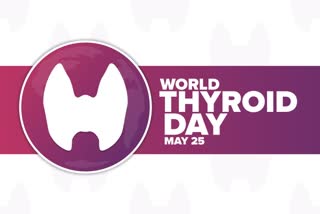World Thyroid Day has been observed every year since 2008 on 25th May. It was established by the American Thyroid Association and European Thyroid Association and later, more organizations joined in. The main objective is to spread awareness about the thyroid and the medical advancements made over the years to treat the disease.
Dr. Sharanya Srinivas Shastry, a dietitian at Apollo Spectra Hospital, Koramangala, Bangalore says, “It is well established that your thyroid hormone status correlates with your body weight and energy expenditure. Derangements in this mechanism can result in conditions like hyperthyroidism, hypothyroidism and thyroiditis where one can experience several health concerns like hair fall/balding, constipation, weight gain/weight loss, irregular menstrual cycles, fatigue, sluggishness etc.”
The thyroid is a hormone-producing gland, which regulates the body’s metabolic functions. The thyroid gland is a small butterfly-shaped endocrine gland, located in the lower front of the neck. Depending upon the hormones being too many or too less, Hyperthyroidism and Hypothyroidism, respectively, may occur. The symptoms and the conditions causing each include:
Hyperthyroidism Symptoms:
Anxiety, Racing heart, Nervousness and restlessness, Irritability, Excess sweating, Thinning skin, Unintentional weight loss, Weakness. Conditions affecting Hyperthyroidism are:
- Graves’ disease- overactive thyroid gland, producing too many hormones or enlarged thyroid gland
- Thyroid nodules- nodules are overactive within the thyroid
- Thyroiditis- inflammation of the thyroid gland
- Excessive iodine
Hypothyroidism Symptoms:
Fatigue, Dry hair and skin, Weakness, Weight gain, Slow heart rate, Constipation, depression, Sensitivity to cold. Conditions affecting Hypothyroidism are:
- Thyroiditis- inflammation/swelling of the thyroid gland
- Hashimoto’s thyroiditis- an autoimmune condition
- Postpartum thyroiditis- a condition in women after childbirth, which is usually temporary
- Iodine deficiency
- Non-functioning thyroid gland
Managing Thyroid During COVID-19
- Try relaxing with some yoga and meditation. This will help reduce stress, especially from all the chaos and negativity in the outer world
- Maintain a healthy weight by eating healthy food and do not binge eat as you stay home. Also, avoid emotional eating.
- Take your medications regularly, without delaying them. Stock up your medicines, so that you don’t run short on them when required.
- Avoid consumption of alcohol, since it may interfere with the functions of the thyroid and its medications.
- Maintain proper sleep hygiene. Some of the symptoms of the thyroid include fatigue, tiredness and weakness. Therefore, proper rest is also important. A sound sleep of at least 7-9 hours a day is good.
- Exercising every day will help maintain a healthy body along with a healthy mind.
- Get yourself vaccinated. Speak to your doctor in case of any queries regarding vaccination.
- If you notice any symptoms of COVID-19, do not delay in seeking medical help and start the treatment immediately.
Foods For A Tension-Free Thyroid
“A well-balanced diet consisting of iodine and essential amino acids (protein of good quality in the right amount) with adequate exercise and regular medication makes sure that you have a healthy, tension-free thyroid.” says Dr. Sharanya. Here is a list of food items she suggests that can be consumed for thyroid issues:
- Saffron
- Banana
- Horse gram
- Baked fish
- Khichdi/Pongal
- Whole grains with rasam/dal/seafood
While all these foods can be considered, we would advise you to first consult with your doctor or dietitian for a more detailed diet plan to keep your thyroid under control. Therefore, altering your dietary habits and switching to a healthier lifestyle can greatly help in managing thyroid.
